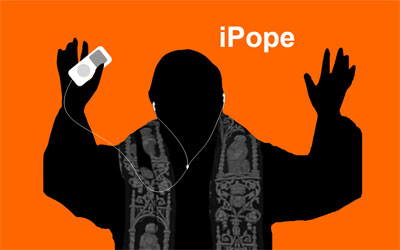By Benedicta Cipolla
c. 2008 Religion News Service
In case you’ve missed the countless news articles, blog posts and television segments, the leader of 1.13 billion Catholics is coming to America.
When Pope Benedict XVI makes his first trip to the United States April 15-20, with stops in Washington and New York, he will claim one in four Americans as his own. The trip will also be a chance to raise his own profile — 81 percent of Americans said they don’t know much or anything about him, according to a recent Marist College poll.
So why does the pope matter? Here’s a look:
— Vicar of Christ
The pope is not just any religious leader. For 17 percent of the world’s population, he is Christ’s chosen representative on earth. As the sole successor of Peter, the apostle to whom Jesus entrusted the keys of his church and care of his flock, the pope has full power and primacy over the Catholic Church.
While each bishop oversees his particular diocese, only the pope, as supreme pontiff and bishop of Rome, exercises moral, doctrinal and jurisdictional authority over all the faithful.
Put another way, no other faith invests so much power in the hands of one man.
“He’s in a position of being in the chair of Peter, which is a very privileged place. But it’s also a place of a pastoral relationship. We are taught this is a place you look to for leadership,” said Dawn Nothwehr, chair of historical and doctrinal studies at Catholic Theological Union in Chicago.
— U.S. Catholics
Six years after the clergy sex abuse crisis erupted, the American church is still reeling from the aftershocks. Five dioceses have declared bankruptcy, priestly and religious vocations remain low, and a recent Pew Forum report revealed that one-third of so-called “cradle Catholics” no longer identify as Catholics. Immigration has helped offset the attrition, creating its own set of issues as the church adapts to the changing face of the faithful.
Benedict, however, will likely focus on the faith’s fundamentals, as he has done throughout the three years of his papacy, highlighting America’s vibrant religious tradition and urging Catholics to retain their identity in the public square.
Benedict’s trip — plus six days of nonstop media attention — could provide a needed shot in the arm.
“It’s not just the sex abuse crisis. There’s a real sense the (American) church needs new vitality, said Timothy Matovina, director of the Cushwa Center for the Study of American Catholicism at the University of Notre Dame.
“If the church is not strong and solid in its own membership and links to its own people, then all the other goals of influencing society, of being leaven in the world, will not be met.”
— Global moral authority
The pope’s position as arguably the most visible religious leader in the world affords him a prime pulpit from which to champion peace and justice. Benedict’s predecessor, Pope John Paul II, is widely credited with helping to bring about the end of communism, and his unprecedented globetrotting brought the church’s social justice mission to millions around the world.
Since his election three years ago, Benedict has spoken out on the “continual slaughter” in Iraq; the “catastrophic” situation in Darfur; the imperative of protecting the environment; and the “scandal” of poverty. It’s no coincidence his first encyclical was on love, without which, he argues, there can be no peace.
While the pope obviously speaks in Christian terms, not everyone who listens to his message need be Christian.
“He does have a spiritual dimension to all of his speeches and writing,” said Nothwehr. “People are more inclined these days to understand a journey of spirituality than any one religious belief. If he can be heard at that level as well, it would be a very opportune moment for him.”
— Western-Muslim relations
In 2006, the pope’s lecture in Regensburg, Germany, caused a major kerfuffle among Muslims when he quoted a 14th-century Byzantine emperor who said that Islam’s Prophet Muhammad brought “things only evil and inhuman, such as his command to spread by the sword the faith he preached.”
Whether he wanted it or not, the speech — and the ensuing controversy — have made the pope Christendom’s pointman in what is shaping up to be the defining issue of the 21st century: Western-Muslim relations.
The tensions, haven’t dampened Benedict’s voice, or actions. At the Easter Vigil in St. Peter’s Basilica last month, the pope personally baptized Magdi Allam, an outspoken critic of both Muslim extremism and Islam itself, and welcomed him into the Catholic Church. The very public conversion did not go unnoticed by both Muslims and Catholics involved in dialogue.
Signs of renewed communication, however, have cropped up among the setbacks. Benedict prayed silently at Istanbul’s Blue Mosque during a trip to Turkey not long after the Regensburg uproar, and he is scheduled to meet in November with the Muslim scholars who initiated a Christian-Muslim dialogue last year. His U.S. visit includes a meeting with about 200 leaders of other faiths in Washington.
“The important thing is that the dialogue and relations are moving forward,” said John Esposito, director of the Center for Muslim-Christian Understanding at Georgetown University. “But it would be an exaggeration not to say there haven’t been some significant hiccups along the way.”
Copyright 2008 Religion News Service. All rights reserved. No part of this transmission may be distributed or reproduced without written permission.

